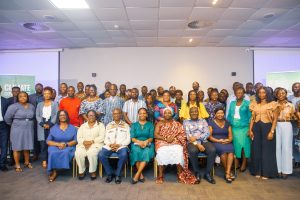…261 MMDAs, ministries to get climate offices
By Kingsley Webora TANKEH
Heeding to fervent calls for the localization of climate governance, the Minister of State for Climate Change and Sustainability, Seidu Issifu has indicated that government is set to open climate change offices in all the 261 Metropolitan, Municipal, and District Assemblies (MMDAs) and climate desks in ministries to bridge the critical gap between national climate ambitions and on the ground realities, empowering local actors to lead the fight against climate change.
In a statement read by the programmes manager at the ministry, Awo Brew, the minister stressed that, “Climate action must be inclusive to be effective. This means ensuring women, youth, traditional leaders, local governments, and civil society are not just consulted but empowered to lead.
The climate change phenomenon is having a devastating impact on lives and livelihoods in every part of Ghana,” citing Accra’s deadly floods and northern Ghana’s escalating water scarcity. She emphasized that, these impacts “disproportionately affect vulnerable groups like women, children, youth, persons with disabilities, and rural communities.”
This landmark policy shift was announced at the National Multi-Stakeholder Dialogue on Climate Policy Implementation organised by Transparency International Ghana (TI Ghana), formerly known as Ghana Intergrity Innitiative (GII), and the Africa Centre for Energy Policy (ACEP).

The dialogue themed, ‘Strengthening Inclusive Climate Governance’, brought together representatives from government, traditional leaders, civil society, youth and women’s groups, and vulnerable community representatives to foster collaboration to explore inclusive solutions for a climate-resilient Ghana.
Despite national policies, including the Nationally Determined Contributions (NDCs) – Ghana’s core pledge under the Paris Agreement, National Climate Change Policy and Adaptation Plan, significant challenges still persist, especially at the local level, where these interventions matter most.
The announcement directly addressed concerns raised earlier about the failure of national policies to translate into effective local action by the Vice Board Chairman of Transparency International Ghana, Dr. Samuel Tetteh Kwashie. “The climate crisis demands not only technical solutions, but inclusive, transparent and accountable systems that leave no one behind,” he declared in his opening address, stressing that, “significant challenges still remain, particularly around limited citizens’ awareness, low participation, inadequate local level integration, and weak institutional coordination.”
Experts believe that government’s unwavering commitment to climate resilience, shown through a dedicated minister at the presidency, will trickle down to the district offices and climate desks at the ministries to translate to tangible outcomes. However, Dr. Kwashie advised that the localization of climate governance be backed by accessible resources and active citizen engagement. “Financial mechanisms [must] be demystified and decentralized,” he added.
He urged that the NDCs be systematically integrated into every district’s Medium-Term Development Plan, linking the country’s climate resilience efforts directly to local budgeting and economic planning and working collaboratively with the Climate Change and Sustainability Minister’s office to ensure coherence and avoid duplication.
Ms. Brew, in the minister’s statement, echoed this sentiment, demanding stakeholders to keep “equity and accountability at the center of the conversation” on climate finance, posing critical questions: “Who benefits from our policies? Who is left out?”
Dr. Kwashie noted that when the citizens are empowered, they can serve as agents of change and accountability. “Citizens can play an active role not just as beneficiaries, but as watchdogs, advocates, and co-creators of climate solutions.”
To this effect, he reinforced TI Ghana’s commitment to “enhancing citizen oversight and social accountability in climate investment and policy processes,” a vital safeguard as resources flow towards the local level.
He stressed that the call for the localization of Ghana’s nationally determined contributions is not for a merely administrative decentralization but the recognization of the role of district assemblies, traditional authorities, and local civil society in crafting adaptation and mitigation strategies tailored to specific communities – from coastal erosion threatening communities in the Volta Region to changing rainfall patterns devastating smallholder farmers in the northern part of Ghana.
Ghana committed to 31 mitigation and adaptation actions across seven economic sectors in its Nationally Determined Contributions (NDCs) under the United Nations Framework Convention on Climate Change (UNFCCC) and the Paris Agreement. However, funding poses a challenge as the country adopts austere measures in light of economic uncertainty. According to the United Nations Development Programme (UNDP), Ghana’s NDCs are expected to cost the state US$22.6 billion.
However, in 2024 alone, Ghana mobilized US$800 million through carbon credit trading with Switzerland and Sweden under Article 6 of the Paris Agreement. The World Bank also disbursed US$4.8 million to Ghana under its Forest Carbon Partnership Facility (FCPF), for reducing 972,456 tonnes of carbon emissions for the first monitoring period under the program – from June to December, 2019.
With Ghana’s carbon market expected to reach US$1 billion by 2030, through various emission reduction projects, the country stands the chance to utilize these funds for properly targeted mitigation interventions, through these local offices for greater impact.










